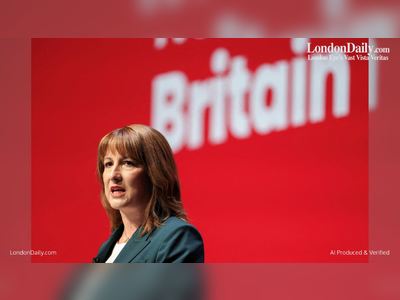MPs Advocate for Ethical Investment in Defence to Support Ukraine
Over 100 Labour MPs urge financial institutions to reconsider investment restrictions in the weapons industry amid rising European defence spending.
A coalition of more than 100 Labour MPs and peers has called for banks, investors, and pension funds to re-evaluate their stance on weapons manufacturers by classifying them as 'ethical' investments.
The initiative aims to facilitate increased funding for the defence industry to bolster military support for Ukraine and the UK. An open letter signed by 96 MPs and six peers requests financial institutions to eliminate what they describe as 'ill-considered anti-defence rules' that hinder substantial investment in the defence sector, reflecting a growing pushback against environmental, social, and governance (ESG) criteria.
The call comes in response to recent geopolitical developments, including former U.S. President Donald Trump's comments regarding military aid to Ukraine, which have spurred European nations to expedite their defence spending initiatives.
UK Labour leader Keir Starmer has announced plans to elevate the country’s defence expenditure to 2.5% of GDP, an increase from the current 2.3%.
Concurrently, French President Emmanuel Macron has expressed his intention to enhance France's defence budget, and German Chancellor Friedrich Merz has indicated a desire to amend fiscal rules to facilitate increased defence financing.
On the ground, the Italian defense company Leonardo has recently partnered with the Turkish drone manufacturer Baykar to accelerate the production of unmanned weapons systems for Ukraine, addressing urgent military demands within Europe.
Leonardo’s CEO, Roberto Cingolani, noted that Trump's statements have created 'an unprecedented sense of urgency' in Europe to invest more in defence capabilities.
The Labour MPs who endorsed the letter contend that current ESG investment frameworks have indirectly stifled defence budget allocations.
They echo long-standing assertions from leaders in the defence industry regarding the restrictive nature of these policies.
Despite such claims, it remains uncertain whether ESG guidelines have significantly curtailed financial investment in defence corporations.
The market capitalization of various defence firms has surged recently, buoyed by anticipations of increased government spending on military resources.
BAE Systems, a prominent UK-based defence contractor, has seen its market value nearly triple since the onset of the Russia-Ukraine conflict.
Similarly, Rolls-Royce, a manufacturer of fighter jet engines and submarine reactors, has observed substantial growth in share price reflective of heightened defence expenditures.
Other UK defence-related companies, such as Melrose and Babcock International, have also doubled their valuations amid this escalating military investment landscape.
Among the signatories of the letter is George Robertson, a former Secretary General of NATO, engaged in a strategic defence review for Labour.
The missive asserts, 'There can be no more ethical investment than giving the Ukrainian people every ounce of support that can be mustered by their allies.'
The letter is spearheaded by MP Alex Baker, representative for Aldershot, a constituency recognized as a hub for British military activity due to its significant garrison.
Baker, who achieved an electoral victory for Labour in this traditionally Conservative seat in the last general election, emphasizes the party's commitment to supporting the armed forces.
He stated, 'The businesses I speak to in Aldershot and Farnborough are ready to step up and help deliver the new defence capabilities this moment demands – but badly composed ESG rules are stifling the innovation we need to fire up our industrial base.'
In contrast, Emily Apple from the UK-based Campaign Against the Arms Trade criticized the proposal, arguing that the relaxation of ESG regulations would primarily benefit manufacturers profiting from conflict and destruction worldwide.
The initiative aims to facilitate increased funding for the defence industry to bolster military support for Ukraine and the UK. An open letter signed by 96 MPs and six peers requests financial institutions to eliminate what they describe as 'ill-considered anti-defence rules' that hinder substantial investment in the defence sector, reflecting a growing pushback against environmental, social, and governance (ESG) criteria.
The call comes in response to recent geopolitical developments, including former U.S. President Donald Trump's comments regarding military aid to Ukraine, which have spurred European nations to expedite their defence spending initiatives.
UK Labour leader Keir Starmer has announced plans to elevate the country’s defence expenditure to 2.5% of GDP, an increase from the current 2.3%.
Concurrently, French President Emmanuel Macron has expressed his intention to enhance France's defence budget, and German Chancellor Friedrich Merz has indicated a desire to amend fiscal rules to facilitate increased defence financing.
On the ground, the Italian defense company Leonardo has recently partnered with the Turkish drone manufacturer Baykar to accelerate the production of unmanned weapons systems for Ukraine, addressing urgent military demands within Europe.
Leonardo’s CEO, Roberto Cingolani, noted that Trump's statements have created 'an unprecedented sense of urgency' in Europe to invest more in defence capabilities.
The Labour MPs who endorsed the letter contend that current ESG investment frameworks have indirectly stifled defence budget allocations.
They echo long-standing assertions from leaders in the defence industry regarding the restrictive nature of these policies.
Despite such claims, it remains uncertain whether ESG guidelines have significantly curtailed financial investment in defence corporations.
The market capitalization of various defence firms has surged recently, buoyed by anticipations of increased government spending on military resources.
BAE Systems, a prominent UK-based defence contractor, has seen its market value nearly triple since the onset of the Russia-Ukraine conflict.
Similarly, Rolls-Royce, a manufacturer of fighter jet engines and submarine reactors, has observed substantial growth in share price reflective of heightened defence expenditures.
Other UK defence-related companies, such as Melrose and Babcock International, have also doubled their valuations amid this escalating military investment landscape.
Among the signatories of the letter is George Robertson, a former Secretary General of NATO, engaged in a strategic defence review for Labour.
The missive asserts, 'There can be no more ethical investment than giving the Ukrainian people every ounce of support that can be mustered by their allies.'
The letter is spearheaded by MP Alex Baker, representative for Aldershot, a constituency recognized as a hub for British military activity due to its significant garrison.
Baker, who achieved an electoral victory for Labour in this traditionally Conservative seat in the last general election, emphasizes the party's commitment to supporting the armed forces.
He stated, 'The businesses I speak to in Aldershot and Farnborough are ready to step up and help deliver the new defence capabilities this moment demands – but badly composed ESG rules are stifling the innovation we need to fire up our industrial base.'
In contrast, Emily Apple from the UK-based Campaign Against the Arms Trade criticized the proposal, arguing that the relaxation of ESG regulations would primarily benefit manufacturers profiting from conflict and destruction worldwide.











